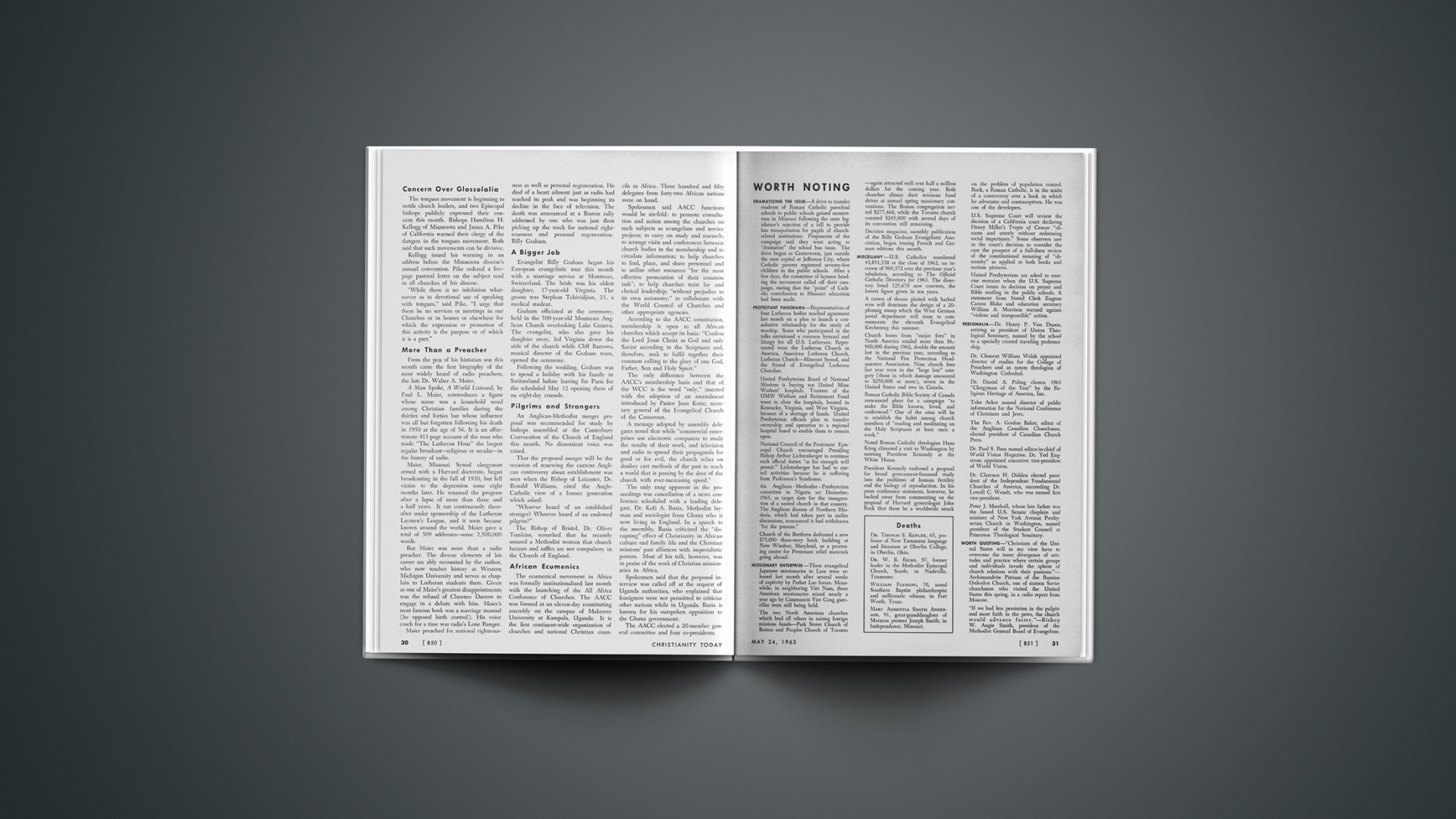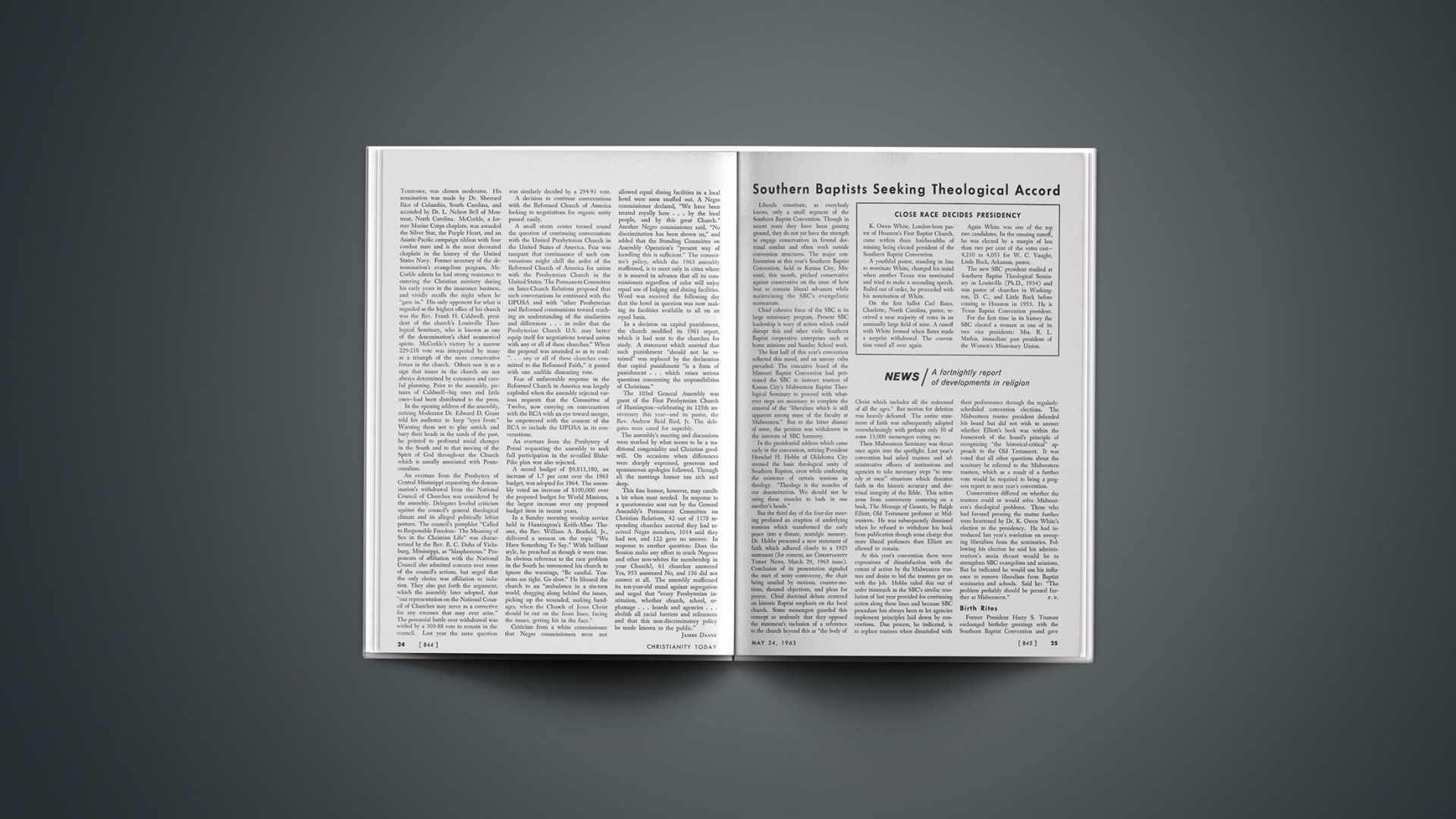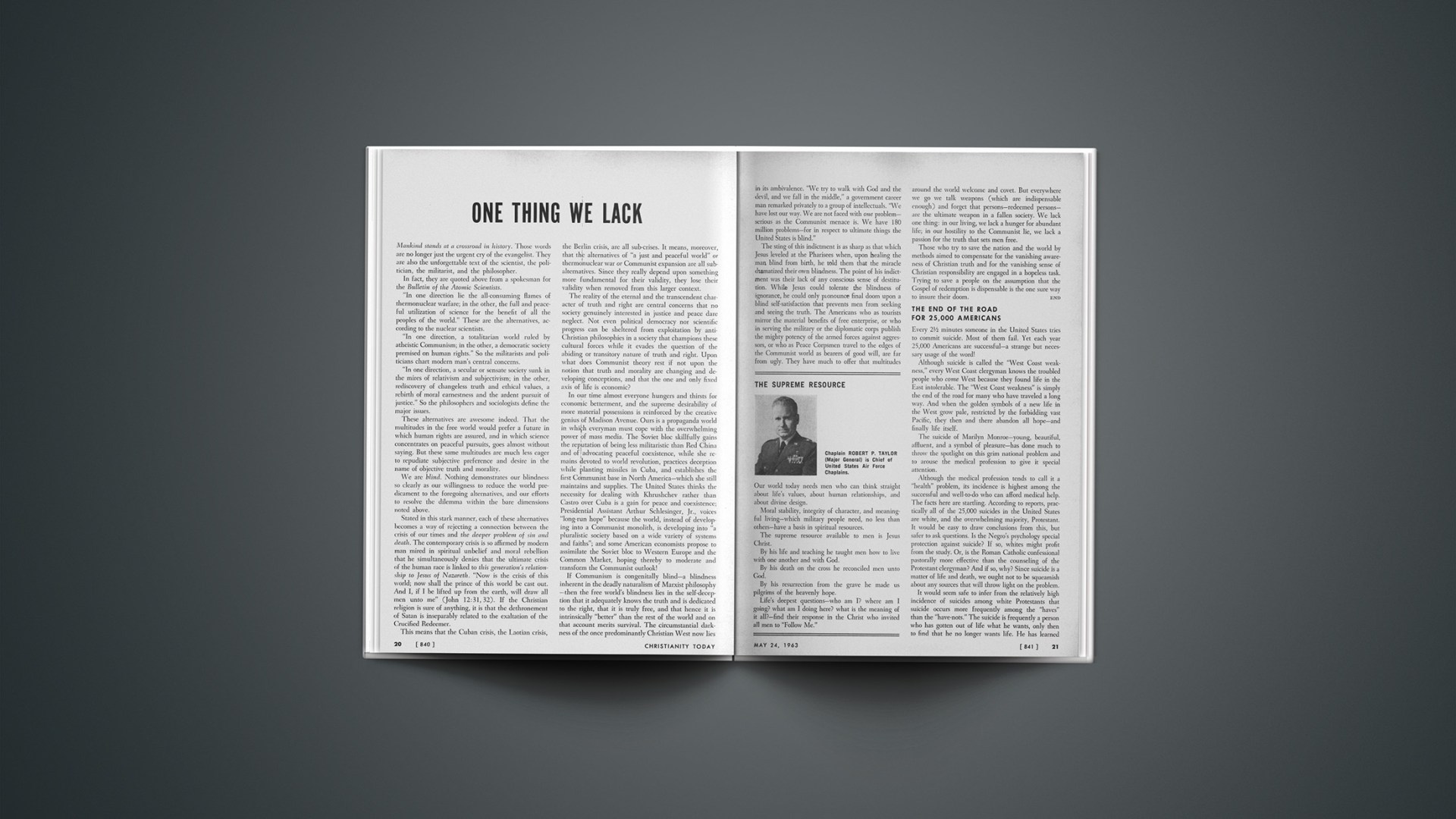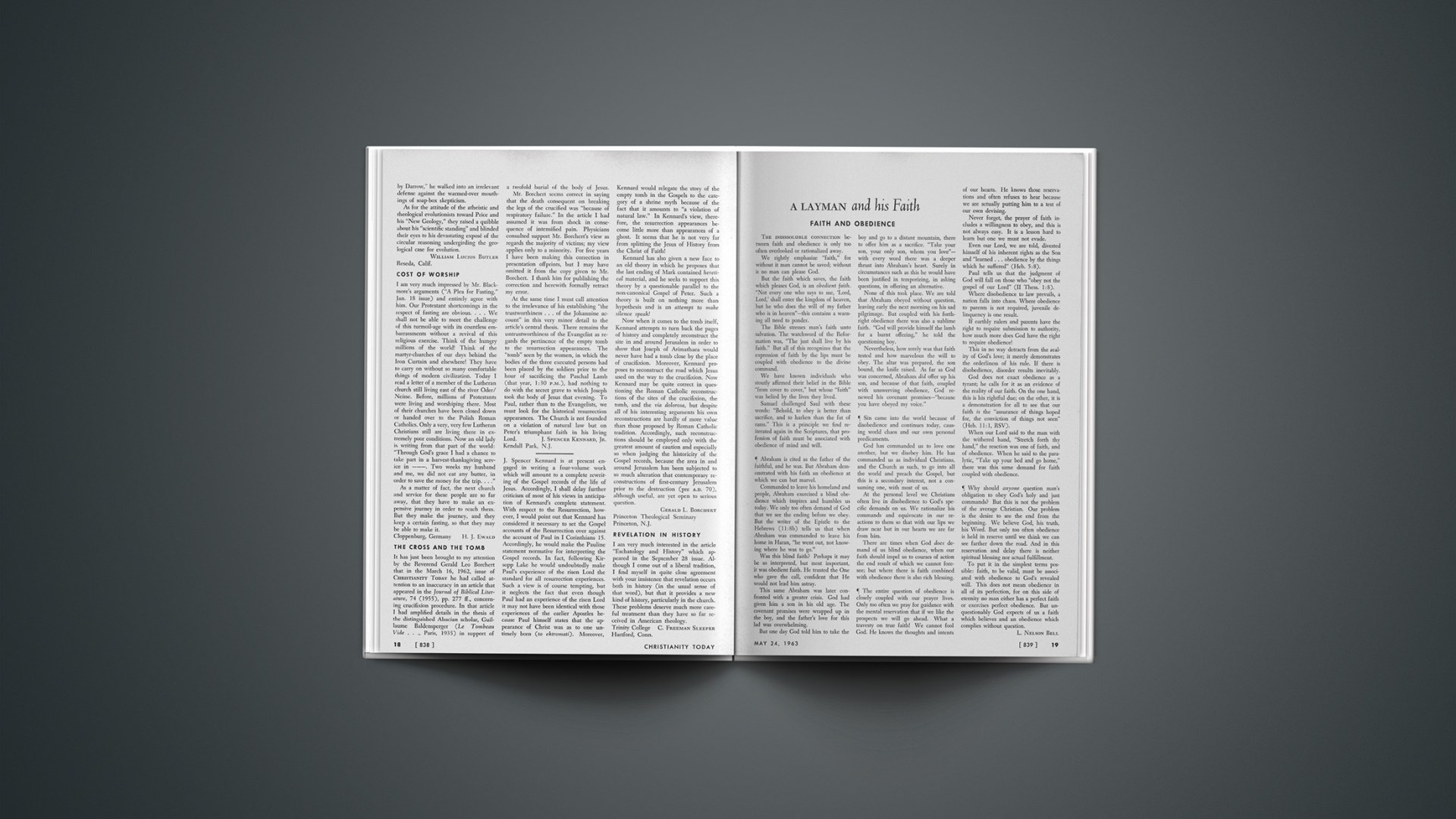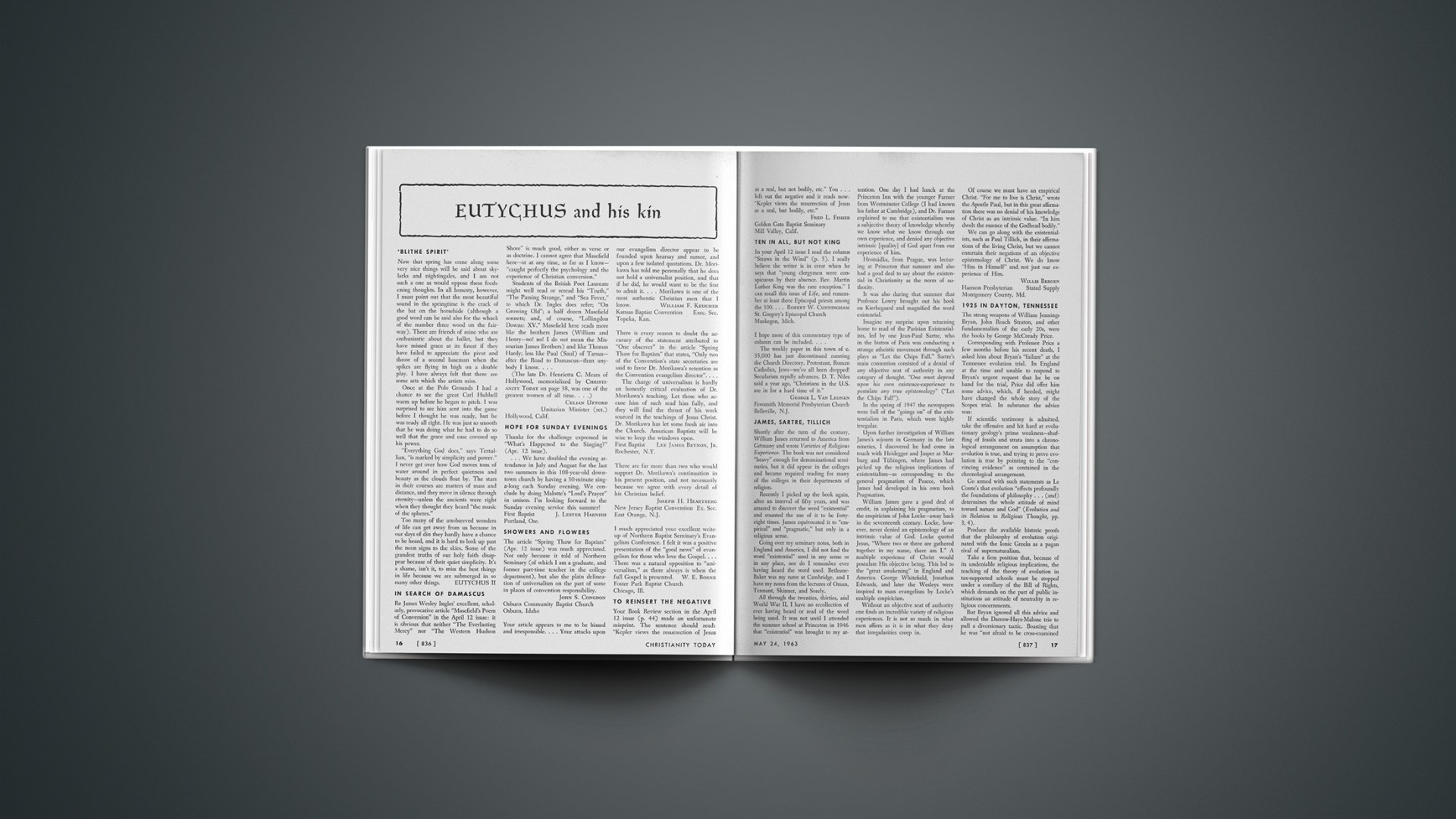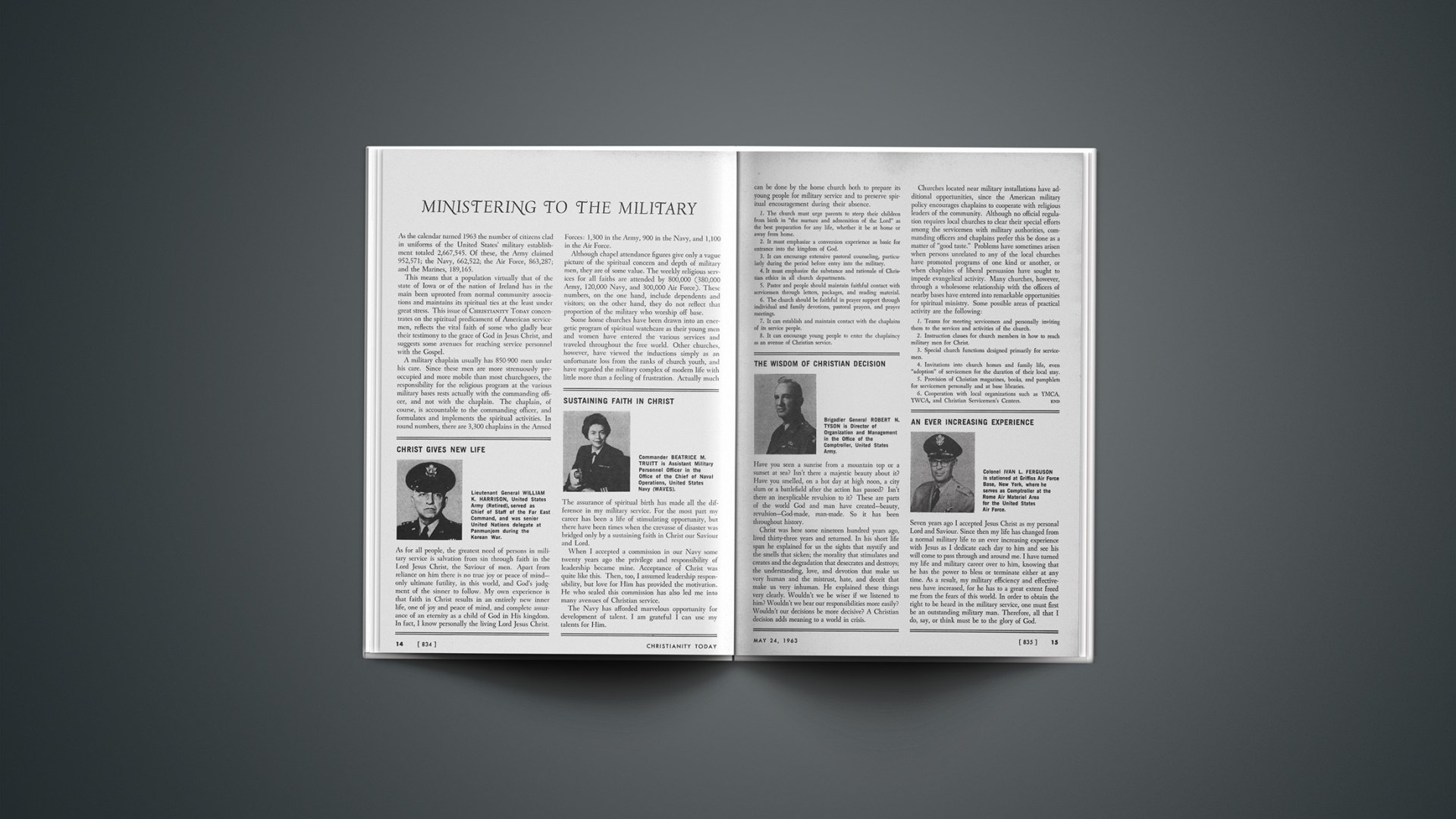If The Foundations Are Weak?
The Challenge to Reunion: The Blake Proposal Under Scrutiny, edited by Robert McAfee Brown and David H. Scott (McGraw-Hill, 1963, 292 pp., $6.50), is reviewed by Geoffrey W. Bromiley, Professor of Church History and Historical Theology, Fuller Theological Seminary, Pasadena, California.
This book is a symposium devoted to analysis of the Blake-Pike reunion proposal from several different angles. In some cases the essays are historical, in others denominational, in others again sociological, and in a final group theological. Dr. Blake himself contributes a closing reconsideration in which he expresses confidence that the suggested plan has stood up under examination. Useful appendices contain the original sermon, Dr. Pike’s reply, and some basic Anglican documents relevant to the situation. Brief but helpful bibliographies are given after each essay.
Inevitably in a work of this kind there is a certain amount of overlapping. Although the standard of thought and writing is generally high, there is also an unavoidable inequality of treatment. Attention may be drawn to a few of the more outstanding essays. The discussion of the New Testament church by Bruce Metzger is an excellent survey. No less impressive is the review of the question of reunion during and after the Reformation by John T. McNeill. Robert Nelson has contributed an able and interesting essay on recent Asiatic schemes, such as that of South India. Markus Barth plays effectively the role of “the adversary” by putting some awkward and searching questions on the priesthood of the laity and the theology of the sacraments, though he himself does not supply any alternative answers.
What is the general impression from a perusal of these various essays? On the whole, they seem to be generally in favor of the proposal. Difficulties are necessarily seen at various levels, and there is question as to the ultimate goal or value of such a merger. But Dr. Blake is right enough in his conclusion that the proposal stands up reasonably well to the many-sided analysis to which it is subjected. This seems to be the view of the editors also in their introductory review of the enterprise.
Nevertheless, it is significant that endorsement is weakest at the theological level. Indeed, it is a striking fact that there is so little theological discussion in the present volume. One suspects that the reason is that the proposal itself contains so little theology anyway. It is essentially the construct of the ecclesiastical man of affairs. It is almost an ecclesiastical equivalent of the business merger. It does not even invite real theological discussion. Like so much of our modern practice, it bypasses biblical and doctrinal issues as though they were merely theoretical and obstructive. Even the invocation of the theme of death and resurrection is here given a practical application—the churches are to die to their present structures and to reemerge in a new form. No guarantee is given that the new form will in fact be a “resurrected” form in the true sense, i.e., that it will not be conformed to the world but will be transformed by the renewing of the mind. In other words, neither the proposal nor the bulk of this able and interesting symposium really comes to grips with the basic question of the nature and goal and structure of true Christian unity.
It is at this point that the proposal really demands profound and detailed analysis. It is also at this point, as Dr. Barth’s essay suggests, that the ultimate inadequacy of the proposal, and the peril of its attempted application, could well be revealed.
GEOFFREY W. BROMILEY
And Your Cloak Also
Spurgeon: The Early Years (1834–1859), a revised edition of his autobiography (Banner of Truth Trust, 1962, 500 pp., 21s.), is reviewed by Godfrey Robinson, Minister, Main Road Baptist Church, Romford, Essex, England.
Some of us still have on our shelves the cumbrous four-volume edition of C. H. Spurgeon’s autobiography, compiled by his wife and private secretary and long since out of print. Large books, like long sermons, are no longer fashionable, and the Banner of Truth Trust has reprinted the original Parts I and II as a single and most attractive volume (Parts III and IV to come later). A certain amount of non-biographical material has been omitted, but Spurgeon’s own contributions have been retained practically in full.
Who was this phenomenon? At the age of seventeen he was the pastor of a country congregation meeting in what had been a dovecote at Waterbeach in Cambridgeshire. Within five years he had London at his feet. In his final illness the attention of the civilized world was centered on him “in column after column of almost every newspaper.” Opinions about him varied. “The sauciest dog that ever barked in the pulpit” was one.
In these pages Spurgeon lives again, and we are permitted to look deep into his heart. It is all here—the hatreds and jealousies of lesser men, the loneliness of eminence, the robust humor, the astonishing command of language, the passion for his Lord. “In Spurgeon’s heart,” wrote Archibald Brown, one of the “Governor’s” own men, “Jesus stood unapproached, unrivalled.… He was our Lord’s delighted captive.” This handsome volume, so beautifully produced and inexpensively priced, is a delight to handle. The reader will wear out his pencil marking passages worth noting—and quoting. If you feel you cannot afford it, then, as C. H. S. himself might have said, “Sell your waistcoat, and buy it!”
GODFREY ROBINSON
The Demonic
Christ and the Powers, by H. Berkhof (Herald Press [Scottdale, Pa.], 1962, 62 pp., paper, $1.25), is reviewed by John Joseph Owens, Professor of Old Testament Interpretation, Southern Baptist Theological Seminary, Louisville, Kentucky.
When man’s mind is being pulled in every direction by varying philosophies of life, it is important to see faith as the crowning element of victory and success. Dr. Berkhof, professor of dogmatic and biblical theology in the University of Leiden, wrote Christus en de Machten in 1953. Now Dr. John Howard Yoder provides for us a very readable and clear English translation.
The central theme is an interpretation and explanation of the meaning of “powers” as found in Pauline thought. In Romans, Corinthians, Ephesians, and Colossians, Paul speaks of “principalities” and “powers.” The author does not make specific modern definitions or identifications of these powers. But in general terms he describes the biblical denunciation of the powers as the Old Testament prophet would denounce Baalism. The general approach is that any influence or power which sets itself over against Christianity would be classed as one of the powers. It is from this thesis that Dr. Berkhof draws the title Christ and the Powers, inasmuch as the entire booklet is devoted to Paul’s use of the terms.
In this age of historical and demonstrable powers, we are prone to put theology into one area and everyday life into another. This small paperback book speaks out for the validity of the Christian faith as over against the “powers” of Communism, secularism, nihilism, and so on. Dr. Berkhof speaks of the powers as belonging to the area of Paul’s view of the world instead of to his theology.
JOHN JOSEPH OWENS
Fair Presentation
New Testament Theology, by Frank Stagg (Broadman, 1962, 361 pp., $5.95), is reviewed by Merrill C. Tenney, Dean of the Graduate School, Wheaton College, Wheaton, Illinois.
“Biblical theology” has come into its own once more, and writers of all schools of theological thought are offering their contributions. New Testament Theology is written by a Baptist who represents the more conservative wing of recent writers. Basing his work on the text of the New Testament, he has written a classified summary of its doctrinal content for classroom teaching. Although he does not attempt a philosophical articulation of theology, he follows a logical progression beginning with “The Bible: Its Nature and Purpose” (which is the medium of revelation), and then proceeding to “The Plight of Man as Sinner,” “The Christology of the New Testament” (God’s answer to sin in Christ), “The Doctrine of Salvation,” “The Death and Resurrection of Jesus,” and “The Kingdom of God” (which embraces the purpose and outcome of salvation). Following these are several chapters dealing with the Church—its ordinances, ministry, and ethics, with a concluding chapter on “Eschatology: The Goal of History.”
The book is a fair representation of the total scope of New Testament theology. The discussion of the nature of sin and the treatment of the person of Christ are quite thorough and satisfactory. The author endeavors to let Scripture speak for itself without minimizing or exaggerating exegetical problems, and he frankly confesses inconclusiveness on some points, such as “baptism for the dead” (1 Cor. 15:29). In regard to this latter problem he suggests that Paul meant by “the dead” the “old man” who is put to death that the new man might take his place. One wonders whether this were the precedent that Paul had in mind when he made his argumentative appeal to the Corinthians, however.
Reading for Perspective
CHRISTIANITY TODAY’S REVIEW EDITORS CALL ATTENTION TO THESE NEW TITLES:
★ A Man Spoke, A World Listened, by Paul L. Maier (McCraw-Hill, $4.95). A son tells the life story of the late Walter A. Maier, whose voice on the Lutheran Hour for many years sent the Gospel around the world.
★ The Last Judgment, by ]ames P. Martin (Eerdmans, $4). A historical study to discover whether respect for biblical authority—or something else—determined the understanding of the Last Judgment in Christian thought.
★ The Church’s Use of the Bible, edited by D. E. Nineham (S.P.C.K., 21s.). Eight English scholars investigate the way the Bible has been viewed and handled at various periods in the history of the Church.
The teaching of the New Testament is presented in the light of contemporary thought. Authorities quoted belong almost wholly to the last two decades, and their contributions are evaluated by the text of the New Testament itself. The author expresses freely his theological convictions by differing with others: “The New Testament knows no ‘irresistible grace’ ” (p. 84); “ ‘Justification’ is the creative work of God in which he is making man upright,” for it is more than “a state of acceptance with God” (p. 95); “Reconciliation is God’s own work in restoring man to proper relationship with himself and other persons” (p. 104), in contrast to the idea of appeasement. Some new material on baptism is supplied from pre-Christian Jewish practices (pp. 205–12).
In two or three particulars the reader may not be perfectly satisfied with this book. Dr. Stagg’s statement of the inspiration of the Bible seems somewhat equivocal. “The writer was not concerned to discuss the nature or manner of inspiration. His concern, beyond affirming the fact of inspiration, is to stress the purpose of the God-inspired Scriptures” (p. 3). Unquestionably he affirms the unique authority of the New Testament, but whether it is the truth or a witness could be defined more sharply.
Eschatological teaching could also be more detailed. The author combines the approach of “realized eschatology” and of traditional futurism by interpreting parousia as meaning both Christ’s presence now with his people and a “real coming of Christ to His people” (p. 312) which is still future. The reconciliation of these two concepts needs a fuller exegesis of the New Testament than can be given in the limited pages of this book.
Stagg says that “the New Testament … has much to say about the Holy Spirit” (p. 39), but he does not develop this important topic adequately. Although there are several references to the Holy Spirit under various headings, no one of these does justice to the doctrine.
This work is eminently readable. It contains some fine epigrammatic expressions, such as: “The New Testament offers no salvation which leaves as optional the Lordship of Christ.” Preachers will be able to profit considerably from its word studies, and the general outline will be useful as an index to the sources of Christian theology.
MERRILL C. TENNEY
Who’S Listening?
Breakthrough: A Public Relations Guide for Your Church, by Howard B. Weeks (Review and Herald Publishing Association, 1962, 320 pp., $5), is reviewed by David E. Kucharsky, News Editor, CHRISTIANITY TODAY.
Very few pastors will take the time to read this book. That’s unfortunate, because for many it would spell the difference between mediocrity and success in their churches’ impact. Public relations, strangely enough, still has a bad image in many clergy minds. They think the concept itself is something deceptive, or else they feel public relations is a slippery ideal that you can never really get your hands on.
Once the church had a voice as loud as any other in the community. Today it has been largely drowned out by television, radio, periodicals, mail ads, billboards, flyers, packaging, and a wide assortment of more subtle influences. Everyone wants to say something, but nobody wants to listen. Churches are saying more than they ever did, but there’s also more chaff in the air than ever. The result is a record amount of static and probably an all-time low in effective reception.
This author recognizes implicitly that churches have not faced up to the problems of contemporary communications competition. Although directed primarily to Seventh-day Adventists, his principles have wide applicability. The book is highly readable, down to earth, and packed full of illustrations and practical suggestions.
The fact that the book is a product of Seventh-day Adventists is itself a commendable feature, because this group with its special image problems has one of the most effective public relations systems of any denomination. Weeks himself was formerly international chief of Adventist public relations and is now engaged in doctoral communications study. An unusually gifted young man, he could easily pull down a top salary along Madison Avenue. He has chosen instead to devote his talents to his church, and in this book he has given us the most thorough and practical guide to church public relations available.
DAVID E. KUCHARSKY
Reverent Neoorthodoxy
Harper’s Bible Commentary, by William Neil (Harper & Row, 1963, 544 pp., $5.95; also by Hodder and Stoughton, 1962, 15s., under title One Volume Bible Commentary), is reviewed by John H. Gerstner, Professor of Church History, Pittsburgh Theological Seminary, Pittsburgh, Pennsylvania.
This is a unique and interesting one-volume Bible commentary. First, it proceeds not verse by verse or even chapter by chapter, but, as it were, thought by thought, epoch by epoch. Ideally it calls for the simultaneous reading of the Bible, which is the goal at which the writer has aimed.
Second, Neil combines popular writing with deft critical touches. In a few sure and facile strokes he is able to paint the whole JEDP canvas and three “Isaiah”s, for example. Without any learned digressions our author brings his readers immediately up to date on the results of prevailing modern criticism and then, with remarkable ease, relates the Bible story in that framework. What Wellhausen, Barth, Bultmann, Noth, and others have tried to do for the scholar, Neil offers to the general reader.
Our third observation is a warning often uttered by another commentator, John Calvin. Beware of separating the Word of God from the Bible. If the Bible is not to be depended upon as the Word of God, are men not inevitably obliged to make their own conjectures into the Word of God?
We do not approve of the position of this book, but we do recommend its reading for what it is: an excellent, up-to-date statement of the Bible as seen through the eyes of a competent, reverent neoorthodox scholar writing skillfully for Everyman.
JOHN H. GERSTNER
Less Pithy
A Commentary on the Holy Bible, Volume II: Psalms–Malachi, by Matthew Poole (Banner of Truth Trust, 1962, 1030 pp., 30s.), is reviewed by A. Skevington Wood, Evangelist-at-large, York, England.
Poole was one of the ministers ejected from the Anglican church in 1662 as being unready to declare his unfeigned assent and consent to the contents of the Prayer Book. His abridgment of the Crtici Sacri (a monumental encyclopedia of exegesis) equipped him to launch out as a commentator in his own right. His posthumous Annotations, as they were originally called, deserve to rank alongside the better-known work of Matthew Henry. Poole is less pithy in homiletical appositeness, but more exact and informed in his close treatment of the text.
A. SKEVINGTON WOOD
Can It Conserve?
In Defense of Freedom: A Conservative Credo, by Frank S. Meyer (Regnery, 1962, 179 pp., $3.95), is reviewed by Irving E. Howard, Assistant Editor, Christian Freedom Foundation, New York, New York.
In this age of conformity, a reader looking for intellectual stimulation will not find it in the tired, worn-out phrases of the liberal collectivist literature, but will be rewarded by reading the books emanating from the ferment of conservative thought. Frank S. Meyer’s In Defense of Freedom is such a book. It is critical, not only of the liberal collectivist attempt to destroy liberty but also of the New Conservative inadequate defense of freedom. Thus the book is an example of the conservative movement’s ability to be self-critical. Since Meyer is a senior editor of National Review, such a quality is not surprising.
The author refutes one of the most popular fallacies of our time; namely, that a democratic government is “all of us.” This fallacy, he points out, confuses the power to pass upon who shall govern with the power to govern. Says Meyer: “Even if annual elections changed the governors constantly and men were forbidden to succeed themselves in power, the essential separation of the state from the rest of social existence would still remain.… To grasp this elemental distinction is the first condition of a theory of the state.”
While agreeing with Meyer’s criticism of liberal collectivism, the orthodox Protestant may not give unqualified agreement to his conception of man as a “rational, volitional, autonomous individual.”
Nevertheless, the issue he raises is one which orthodox Protestants should face and—if possible—resolve: “Can the new and rising conservative leadership release and guide the pent-up energies, the intuitive understanding of their heritage, the love of freedom and virtue in the hearts of the American people, before the converging forces of cloying collectivism at home and armed collectivism abroad destroy the very meaning of freedom?”
IRVING E. HOWARD
A Jab For The Reader
Studies in New Testament Ethics, by William Lillie (Westminster, 1963, 189 pp., $3.95), is reviewed by James Daane, Editorial Associate, CHRISTIANITY TODAY.
Presbyterian Lillie, since 1953 a lecturer in the University of Aberdeen, presents fifteen essays on ethics according to the New Testament. Included are essays on the New Testment’s attitude toward law and justice, the state, wealth, work, children, and marriage and divorce.
He is a strong believer in the reality and function of natural law. Although he recognizes the limitations of natural law, he regards the Old Testament Holiness Codes as later developments of legal traditions which can be traced back beyond the earliest limits of biblical revelation. He urges natural law as the common element of all codes of morality, and as the common ground making possible Christian and non-Christian cooperation in social action. The same motif emerges in his claim that agape sublimates and transforms eros in the Christian man, and in the claim that agape is reflected even among animals, as when a mother sacrifices herself for her young. At the same time he contends that there is a unique, mysterious, noumenal element in God’s summons to obedience and service, an element that makes Christian ethics transcend good and evil as mere moral constructs.
While at many points his doctrinal and ethical positions are deeply evangelical, his view of the Bible as revelation is something else. He can smile at certain biblical stories, facilely declare Paul to be in error, and yet appeal to little-known texts for proof of the rightness of his positions with a confidence that expects no rebuttal.
Nonetheless, within the ambiguities of his conception of biblical revelation, he can endorse the most unpopular Christian positions; he can also shock the reader by what he challenges and rejects, and by his fresh insights.
I doubt whether Lillie’s ethics is consistent within the terms of his own logic. Yet his razor-edged analysis, his detection of the weak spots in other current ethical positions, and the happy unexpected turns of his thought serve the needed function of exposing those all too simple and easy codifications of ethics in which man is more in control of New Testament ethical imperatives than controlled and challenged by them.
The essays are lucid, the thought and style clear and often sharp enough to stab the reader out of an easy ethical complacency, into the necessity of doing some ethical reflection of his own.
JAMES DAANE
New Approach
The Home Front of Jewish Missions, by Albert Huisjen (Baker, 1962, 222 pp., $3.95), is reviewed by H. Leo Eddleman, President, New Orleans Baptist Theological Seminary, New Orleans, Louisiana.
This book is well documented and presents a thorough historical background of the delicate subject of Jewish-Christian relations. Perhaps as no other book, this volume gives the attitude of Jewish people towards the polemic between the Church and Judaism as it is revealed in the extrabiblical Jewish literature, including the Talmud, Mishnah, and others.
One of the book’s strong points is its tactful analysis of the failures of all approaches on the part of Christians toward Jews up until now. The author is fair but accurate in dealing with such items as the false “traditions” about Jesus, the Inquisition, and the affect of secularism on the total picture of Jewish-Christian relations.
By virtue of decades of experience in the field, this author is able to point to the basic principles of a new approach to Jewish people, particularly to the parish or local church level for reaching the Jewish heart.
H. LEO EDDLEMAN
Book Briefs
Institutionalism and Church Unity, edited by Nils Ehrenstrom and Walter G. Muelder (Association, 1963, 378 pp., $6.50). A study by 16 scholars from all over the world of theological-sociological relationships as they exist in ecclesiastical institutionalism, in biblical thought, and in other aspects of institutionalism. Prepared by the Study Commission on Institutionalism, Commission on Faith and Order, World Council of Churches.
Preaching on Old Testament Themes, edited by C. E. Lemmon (Bethany Press, 1963, 128 pp., $2.50). Although the book claims to be a series of sermons on Old Testament themes and to present “a sampling of the best in contemporary Disciple preaching,” its sermons, while highly readable, are generally superficial and frequently unbiblical. In most Christ is scarcely visible, and in many there is a social concern with but short biblical rootage.
Isaiah, by Elmer A. Leslie (Abingdon, 1963, 288 pp., $5). Isaiah (First, Deutero, and Trito) chronologically rearranged (second verse treated almost 100 pages after the first), translated, and interpreted.
Heart of a Stranger, by Lon Woodrum (Zondervan, 1962, 136 pp., $2.50). A religious novel about a bank robbery and a conversion to Christianity which some will thoroughly enjoy and about which others will say with one of its characters: “Yucca juice.”
The Epistles to the Thessalonians, by Harold J. Ockenga (Baker, 1962, 142 pp., $2.75). Helpful comments and insights on the key texts and motifs of this epistle.
Knight’s Treasury of Illustrations, by Walter B. Knight (Eerdmans, 1963, 451 pp., $5.95). A better-than-average collected mass of illustrations and poems, facts, statistics (some out of date), observations, and jokes, of use to Christian speakers.
World Without Want, by Paul G. Hoffman (Harper, 1962, 144 pp., $3.50). Arguing that it is now for the first time possible to eliminate poverty the world over, Hoffman (of Marshall Plan fame) pleads that the economically advanced countries should invest in foreign aid to the world’s 100 underdeveloped countries. Such aid, he says, is morally right and economically profitable, and politically is the only expedient way to avoid explosive revolution in a world where two-thirds of the people daily earn only the equivalent of a half loaf of bread.
Christian Education as Engagement, by David R. Hunter (Seabury, 1963, 128 pp., $3). This book sets forth the theological and educational foundations of the Episcopal Church’s “new curriculum” which has aroused a storm of both praise and protest. For the educator.
Daily Life Prayers for Youth, by Walter L. Cook (Association, 1963, 95 pp., $1.75). Prayers (very like sermonettes) which encourage thought of God in the nooks and crannies of teen-age life.
The Handbook of Public Prayer, edited by Roger Geffen (Macmillan, 1963, 204 pp., $5.50). Nearly 1,000 prayers gathered from Scripture and diverse Christian traditions of all ages for use on public occasions.
The Apocrypha (University Books, 1963, 238 pp., $12.50). A facsimile of the famous Nonesuch edition of 1924. A thing of beauty and fine craftsmanship.
The Day Camp Program Book, by Virginia W. Musselman (Association, 1963, 384 pp., $7.95). In a grand manner what it claims to be.
Das Wesen Des Reformatorischen Christentums, by Emanuel Hirsch (Walter de Gruyter & Co. [Genthiner Str. 13, Berlin W 30], 1963, 270 pp., 18 German Marks). A teeth-in-it kind of discussion of the central affirmations of the Reformation.
The Believer’s Unbelief, by Roy Pearson (Thomas Nelson, 1963, 175 pp., $3.95). The book’s best example of its title is the author’s exceedingly low view of the Old Testament, whose God is “terrible,” “immoral,” and of “steady bitterness.” As men “struggled slowly upward,” says the author, “God revealed himself in surer form to them.” This book is part of the disease, not the cure.
That the World May Believe, by Hans Küng (Sheed & Ward, 1963, 149 pp., $3). Küng writes ten letters to a Roman Catholic university student and in both style and substance speaks to the personal and theological problems of such a student in the modern world.
This Before Architecture, by Edward S. Frey (Foundation Books [122 Old York Road, Jenkintown, Pa.], 1963, 127 pp., $3.50). Six addresses on church architecture by the executive director of the Lutheran Church in America’s Commission on Church Architecture. Theology, not pictorial form and appearance, he contends, should determine the shape of the House of God.
Sermons for Special Days and Occasions, by G. Hall Todd (Baker, 1962, 157 pp., $2.50). Sermons by a well-known Philadelphia Presbyterian for such occasions as Mother’s Day, New Year’s Day, Labor Day, and Bible Sunday, in language biblical and modern.
Out of the Depths, by Helmut Thielicke (Eerdmans, 1962, 89 pp., $2.50). Messages coming out of the context of the war and post-war years, directed to basic human needs.
Natural Law and Modern Society, a symposium (World, 1963, 285 pp., $4). Concerned about the assault of modern positivistic science upon objective natural law, various authors argue that natural law is of the very foundation of our view of jurisprudence, culture, sociology, religion, teleology, and public opinion. Writers include Robert M. Hutchins, John Courtney Murray, S.J., and Harvey (Fail-Safe) Wheeler.
Paperbacks
The New Life, by Allan R. Knight and Gordon H. Schroeder (Chaplaincy Services of American Baptist Convention [164 Fifth Avenue, New York 10] and Chaplains Commission of Southern Baptist Convention [161 Spring St., N.W., Atlanta 3, Ga.], 51 pp.). A Baptist-orientated service personnel manual for a chaplain’s instruction class. Six lessons.
The New Life (The General Commission on Chaplains and Armed Forces Personnel [122 Maryland Ave., N.E., Washington 2, D.C.], 40 pp., $.15). Questions, scriptural texts, and pictures which lay out the way of salvation. Written for servicemen.
Opportunity of a Lifetime (Commission on Chaplains of the National Association of Evangelicals [1405 G St., N.W., Washington 5, D.C.], 23 pp., $.15) and Why Didn’t Somebody Tell Me? (The General Commission on Chaplains and Armed Forces Personnel [address above], 32 pp., $.25). Useful and needed information on how to prepare those about to enter the new, strange life of military service.
Reprints
Sermons on Our Mothers, by Joseph B. Baker (Baker, 1963, 125 pp. $1.95). Christian sentiments about motherhood which can only by sentiment be called sermons. First printed in 1926.



